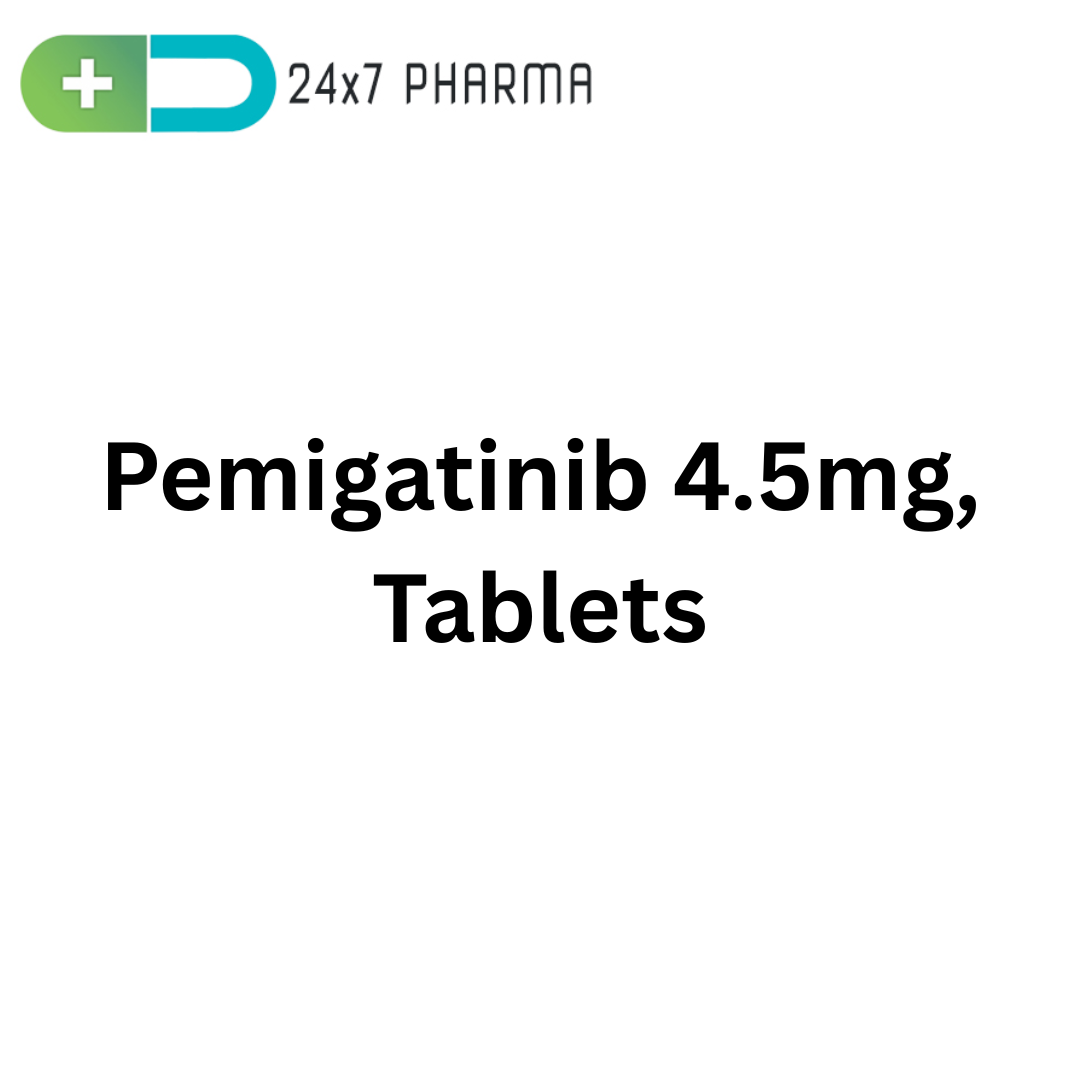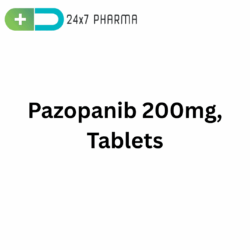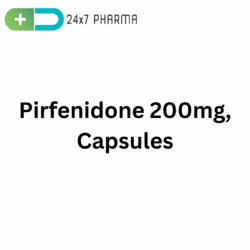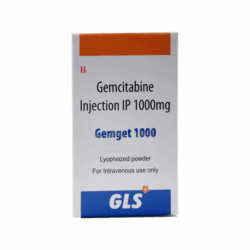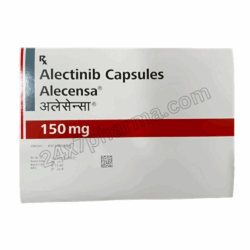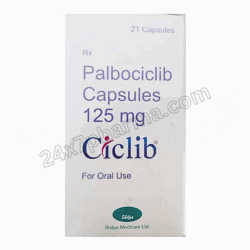Lucipem 4.5mg, Pemigatinib Tablets
Lucipem 4.5mg is a targeted cancer therapy that contains Pemigatinib, a selective inhibitor of fibroblast growth factor receptors (FGFR). Developed for precision oncology, it is primarily used in the treatment of cholangiocarcinoma (a rare cancer of the bile ducts) and other tumors associated with FGFR genetic alterations. Lucipem represents a significant advancement in personalized cancer treatment by offering an option based on specific genetic markers.
What is Lucipem 4.5mg (Pemigatinib)?
Lucipem 4.5mg is an oral anticancer drug formulated with Pemigatinib, a small molecule kinase inhibitor. It is marketed for patients whose cancers exhibit FGFR2 fusions or rearrangements. Approved by regulatory bodies such as the US FDA under accelerated pathways, Pemigatinib is used when the cancer is unresectable (cannot be removed by surgery) or has metastasized (spread to other organs).
How it Works / Mechanism of Action
Pemigatinib works by inhibiting the activity of FGFR1, FGFR2, and FGFR3—proteins that play a vital role in cell growth, survival, and differentiation.Cancer and unchecked cell proliferation can result from FGFR gene fusions or rearrangements. By selectively binding to these receptors, Pemigatinib blocks downstream signaling pathways such as MAPK, PI3K-AKT, and PLCγ, which are responsible for tumor growth. This inhibition suppresses tumor progression and induces cell death in cancer cells with FGFR abnormalities.
How to Use / Indications
Lucipem 4.5mg is indicated for:
- FGFR2 fusion or rearrangement in an incurable locally progressed or metastatic cholangiocarcinoma, as verified by a diagnostic test approved by the FDA.
- It is also being studied and used off-label in urothelial carcinoma, glioblastoma, and other rare FGFR-driven tumors in clinical settings.
How to Take / Dosage
Standard Dosage:
- The recommended dose is 13.5 mg once daily for 14 days, followed by 7 days off in a 21-day cycle.
- Lucipem 4.5mg tablets are usually taken in a divided dose (e.g., 3 tablets) to reach 13.5 mg per day.
Administration Tips:
- Take it at the same time every day.
- Can be taken with or without food.
- Swallow tablets whole with water. Do not crush or split.
- Avoid taking with grapefruit or grapefruit juice (may alter drug metabolism).
Other Dosage Forms and Adjustments
While Lucipem is commonly use as a 4.5mg tablet to allow dose titration and adjustment, it may be available in:
- Pemigatinib 4.5mg, 9mg, and 13.5mg strengths for flexibility.
Dose adjustments may be required for:
- Liver or kidney impairment
- Adverse effects such eye toxicity or hyperphosphatemia
Drug interactions
- If toxicity occurs, the dose may be reduce to 9 mg or even 4.5 mg daily, or temporarily withheld.
Side Effects
Like all targeted therapies, Lucipem (Pemigatinib) has associated side effects, some of which can be serious:
Common Side Effects:
- Hyperphosphatemia (high phosphate levels)
- Nail changes
- Dry mouth
- Fatigue
- Hair thinning or loss
- Diarrhea or constipation
- Loss of appetite
Serious Side Effects:
- Eye disorders (e.g., retinal detachment, blurred vision)
- Electrolyte imbalances (especially phosphate, calcium)
- Kidney or liver dysfunction
- Stomatitis (inflammation of the mouth)
- Non-healing mouth ulcers
- Skin rashes or hand-foot syndrome
Monitoring:
- Regular eye exams
- Blood tests for electrolytes, kidney, and liver function
- Monitoring for signs of tumor lysis syndrome in the early phase
Storage
- Store Lucipem 4.5mg tablets at room temperature (20°C to 25°C).
- Protect from moisture and direct light.
- Keep it in the original packaging until use.
- Keep out of reach of children.
- Do not use expired medication.
Benefits
Lucipem offers numerous benefits, especially for patients with no other targeted options:
- Precision Medicine: Designed for tumors with FGFR alterations, improving outcomes.
- Oral Administration: Convenient and non-invasive, unlike IV chemotherapy.
- Disease Control: Shown to improve progression-free survival and overall response rate in clinical trials.
- Tolerability: Generally better tolerated than traditional chemotherapy.
- Hope in Rare Cancers: Effective in conditions like cholangiocarcinoma where few treatments exist.
Prescription
Lucipem 4.5mg is a prescription-only medicine and should be prescribed by:
- Oncologists or cancer specialists
- Based on confirmed FGFR2 fusion/rearrangement by molecular testing
The prescription should include:
- Genetic test reports
- Complete blood profile
- Renal and liver function data
- Ophthalmologic baseline screening
Drug Interactions
Lucipem can interact with a variety of other drugs:
Avoid or Use with Caution:
- Strong CYP3A4 inhibitors (e.g., ketoconazole, ritonavir) – may increase Pemigatinib levels
- CYP3A4 inducers (e.g., rifampin, carbamazepine) – may reduce effectiveness
- Drugs affecting phosphate levels
- Antacids and PPIs – can reduce absorption
- Always inform your doctor about:
- All prescription, OTC, and herbal medicines
- Any supplements like calcium, vitamin D, or phosphate binders
FAQs
Is Lucipem a chemotherapy?
No, Lucipem is not traditional chemotherapy. It is a targeted therapy that inhibits specific growth factor receptors involved in tumor growth.
What is Lucipem use for?
For cholangiocarcinoma with FGFR2 fusion/rearrangement.
How is Lucipem take?
Orally once daily for 14 days, followed by 7 days off (21-day cycle).
Conclusion
Lucipem 4.5mg (Pemigatinib) represents a crucial advancement in the treatment of cancers driven by FGFR alterations, especially cholangiocarcinoma. Its targeted mechanism offers precision, improved survival, and better tolerability than traditional options. However, appropriate patient selection through genetic testing and close monitoring for side effects is essential. You must use Lucipem under specialist supervision to ensure safe and effective outcomes.
By offering a focused approach to cancer therapy, Lucipem brings hope to many patients who previously had limited or no effective options.

